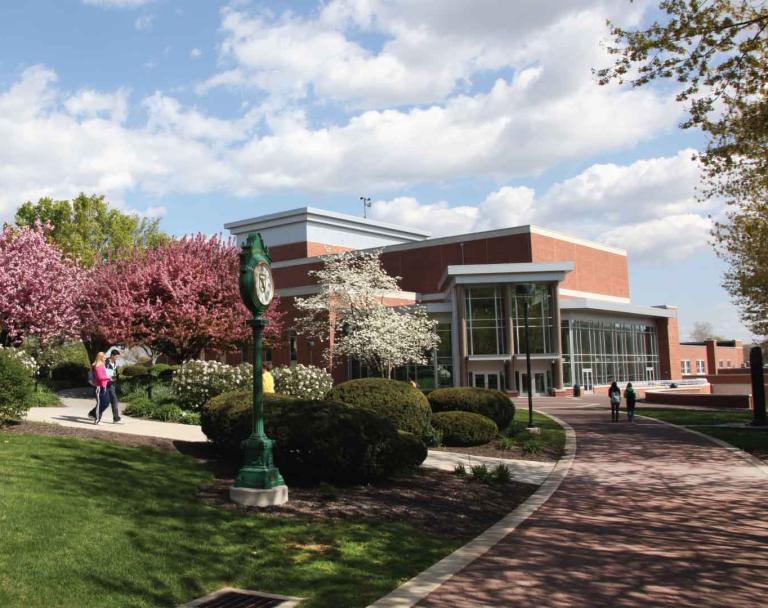Urban Collective

- About Us
- Offices and Departments
- Center for Community Engagement
- Spotlights
- Urban Collaborative
Urban Collaborative Focuses on Renovating Homes Without Displacing Residents
The York College of Pennsylvania initiative aims to create equitable housing and revitalize neighborhoods in York City.
When Lisa Fast decided to buy a house in York City, she heard that she might pay only $30,000, maybe less. Curious, she had her realtor show her such a house. The experience opened Fast’s eyes to the predatory rental practices that plague York.
As she walked through the home, Fast discovered that the appliances and plumbing didn’t work. Water damage stretched from the third-floor ceiling down to the second floor. Ceilings on both floors were on the verge of collapse. What broke her heart was seeing the three children under age five who called the rundown house their home.
“I just felt like these kids don’t have a chance,” she says. “They’re starting off their lives in a horrible situation.”
A collaborative takes shape
Fast, who serves on the Board of Trustees at York College of Pennsylvania, knew about the College’s focus on project-based learning. She began to formulate an idea and talk about it with anyone at the College who would listen. From there, the Urban Collaborative was born under the umbrella of the College’s Center for Community Engagement (CCE).
Still in the start-up phase, the Urban Collaborative has focused for three years on research, information gathering, and finding ways to promote equitable housing and healthy neighborhoods without displacing residents.
“Every discipline at the College can contribute to this,” says Dr. Dominic DelliCarpini, who serves as the Dean of the Center for Community Engagement, Interim Executive Director of the Graham Center for Collaborative Innovation, and the Naylor Endowed Professor of Writing Studies.
DelliCarpini sees a place for students and faculty in the fields of Business, Engineering, Humanities, Communications, Human Services, Sociology, and others to contribute their knowledge, research, and expertise to the Urban Collaborative’s goals. Already over 20 undergraduate and graduate courses have incorporated elements of the initiative into their curricula.
“This really is in the sweet spot of the College,” Dr. DelliCarpini says, “with its experiential learning and approach to urban renewal without displacement.”
The key, he says, is solving the problem with the community, not for the community.
The Urban Collaborative team hopes to accomplish this by forming partnerships with local nonprofits, for-profit groups, and government organizations. One of those early partnerships has been with Fred Walker and Anthony Moore of Four Squares Development.
As the Urban Collaborative was being developed, Moore was one of the community members consulted for his expertise. Inspired by the Urban Collaborative’s mission, he partnered with Fred Walker to form Four Squares Development and Four Squares Construction, which have begun purchasing and renovating homes in York City neighborhoods. Because of mission alignment, the Collaborative has supplied the company with data, mapping, and interns. This information—generated by faculty, students, and the Arthur J. Glatfelter Institute for Public Policy—helps partners to determine what businesses and services may be needed to create complete neighborhoods.
Housing revitalization is just one element of the Urban Collaborative’s holistic approach to the community. DelliCarpini notes that obstacles to home ownership can be removed by financial literacy, building a credit history, and access to a down payment. The Collaborative has partnered with Tenfold, a nonprofit that helps people achieve housing equity and financial security, to offer financial literacy classes at the CCE.
The first class was in April, and those who attend the one-day course and meet other requirements may be eligible for down-payment support from Tenfold. This and other efforts of the Urban Collaborative are aimed at helping to provide neighborhood development without displacing those who live there—and perhaps even help them transition from renting to owning.
The York County Economic Alliance also has begun working with the Urban Collaborative to support start-ups in underserved neighborhoods through its Bloom Grants.
“It’s about healthy neighborhoods,” Fast says. “It’s about what it takes to make an area both viable financially and viable in terms of a thriving neighborhood. Are there schools? Jobs? Healthcare? Transportation? These are all things that are part of thriving, healthy neighborhoods.”
Slow and steady growth
“Our job is to bring people together,” Dr. DelliCarpini says, “It’s really hard, it requires patience.”
While he understands the importance of nurturing the project slowly and deliberately, he knows that during incremental growth members of the community continue to suffer greatly, having few escape routes from generational poverty and predatory practices.
DelliCarpini looks forward to the day when families who never imagined owning a home move into their own rehabilitated houses in their neighborhoods, when a York City child can attend kindergarten through eighth grade in the same elementary school without the threat of a predatory landlord evicting them at will.
“You can’t just fix these things quickly,” he says. “But it is possible if we get the many organizations interested in doing this work to walk in the same direction. Hence, the name ‘Collaborative.’”

